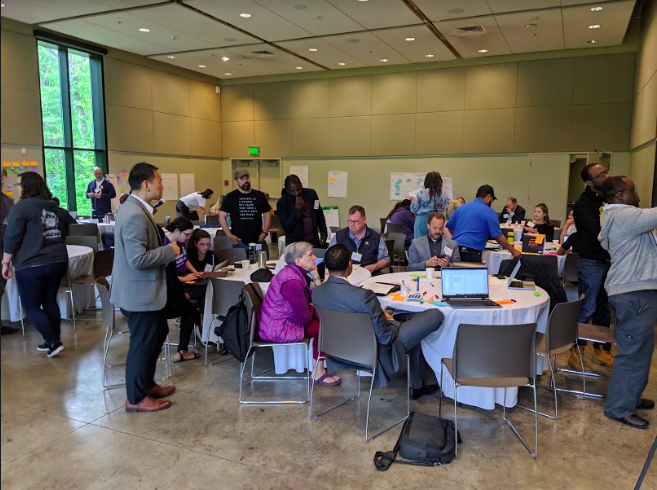Baltimore faces challenges that didn’t appear overnight, and as a result are deep-rooted. So, as is often on view around the city’s tech and entrepreneurship community (as recently as Tuesday night at Johns Hopkins’ Social Innovation Lab’s Impact and Innovation Forum), solving them will require resolve to think systemically and create solutions with a different approach than what’s been taken before.
As if to underscore this point, news broke while I was writing this piece that Catherine Pugh resigned as mayor of Baltimore as she faces multiple investigations related to payments she received for a children’s book series called “Healthy Holly.”
It’s an important moment in the city’s history, and difficult to ignore even for a niche publication such as ours. The scandal that’s engulfed Pugh in the weeks since the Baltimore Sun broke the story that she received $500,000 through a no-bid contract with the University of Maryland Medical System while she sat on that organization’s board shows the need for change on multiple levels.
But in that time, as Baltimore has been in the first days of what will now be an extended tenure under now-former City Council President Bernard C. “Jack” Young, there have also been reminders — albeit on a smaller scale — that the work of the city continues.
As a reporter covering a part of the city’s work that involves the people who seem removed from the political apparatus, those reminders come often to me. Just today, for instance, we covered an announcement that the city has a new emergency alert system.
The work to create lasting solutions also continues. On Wednesday in one of the few buildings amid the wooded area in Cylburn Arboretum, more than 50 people gathered to begin developing the ideas that will be part of the solutions built at Hack Baltimore. Looking out over the trees, it felt appropriately removed from City Hall, even as attendees tackled the challenges that the city government is charged with addressing.
Bringing together organizers of multiple short-duration, tech-constructing events, Hack Baltimore is planned as a citywide tech planning for a citywide hackathon in 2020 that will build solutions in six areas.
Delali Dzirasa, the technologist and founder of Fearless who is the chair for the event and leads along with an organizing committee, said they’re looking to take an approach that ensures projects that are built will be used as solutions by the people they’re designed to help. While hackathons produce plenty of interesting technology and new approaches to solving problems, the fact that they usually take place on weekends can also make them temporary.
So by doing lots of work ahead of time, Hack Baltimore’s organizing team is looking to ensure that the civic leaders who use the solution are getting something they need, and are involved in the process of developing it.
The first step in that process is identifying the challenges and the ideas to help solve them. That’s where the design jam comes in. Dzirasa said the group focused on challenges in areas such as housing, transportation, public safety, workforce development, health and education. The problem statements that arose at this and other events will appear on a portal where they can be accessed by all. Ideas will also be curated directly from the public beyond such events. They’ll be refined, and then ultimately an innovative solution will be pitched against the ideas.
Dzirasa stressed that the most important aspect of the effort is to sustain the work. So they’re documenting the work from the start.
“If we’re going to do this, we’re going to document in a public way and post it on the citywide portal, Dzirasa said.” If we stop at first base, someone should be able to take that and go to second base, and then third base.”
Putting them in that space ensures that what has been developed will live on, even if the people who are leading and working on them changes.







